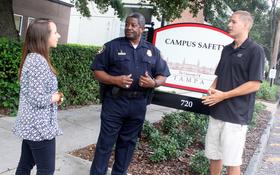Students may select the location for their post-secondary education from a variety of factors, including tuition costs, degree programs available and quality of education received. This is true for prospective community college students, as well as those looking at a possible four-year degree. One factor that may not be at the top of a searching student’s list is campus safety. However, staying safe while you are pursuing your degree is an important characteristic that contributes to the overall college experience. Fortunately, StateUniversity.com has you covered, with annual rankings that let prospective students know which college campuses are considered the safest in the country.
Choosing the Safest School
When StateUniversity.com begins its annual process of ranking U.S. colleges for safety, the first step is to take data directly from the Federal Bureau of Investigation. Since private colleges do not have to report their crime figures to the FBI, some of these schools may not appear on the list. However, all schools that participate in federal student aid programs are required to report crime numbers every year, keeping most of the schools around the country under consideration for the rankings. For the 2011 rankings, about 450 of the largest schools in the United States were evaluated.
This video highlights the breadth and scope of college and university law enforcement volunteer efforts.
Crime reports for 2015 were considered when compiling the most recent rankings. Both crime frequency and severity are considered as participating schools are given a score between zero and 100. The higher the score, the safer the school. Crimes evaluated in the process included aggravated assault, burglary, theft and larceny, rape, murder,r, and motor vehicle theft, according to the website for StateUniversity.com. Violent crimes get a heavier weight than crimes like motor vehicle theft and burglary.
Virginia Western Top Ranked Community College in the U.S.
The top community college in terms of safety in 2011 was Virginia Western Community College, ranking eighth on the list with a score of 98.94. This campus also received the distinction of the safest college in Virginia overall. StateUniversity.com found that Virginia Western reported no violent crime during 2011, with all the reports of illegal activity comprised of acts like larceny and theft. Despite the low crime statistics for this campus, Virginia Western police chief Craig Harris told WSLS 10 that the police staff for the college is ready for any crisis that might occur.
“We believe that preparing for the worst makes us better equipped to respond to any campus safety issue no matter the size or scope,” Harris stated in a news release.
Tennessee College Receives Close Second in Rankings
Northeast Community College in Blountville, Tennessee, is immediately behind Virginia Western in the 2012 rankings. This school was founded in 1966 and continues offering professional and college-transfer programs. Holding the ninth place in the StateUniversity.com rankings, Northeast Community College boasts a total score of 98.92, just below the high score achieved by the Virginia college. Northeast also had no record of violent crime in 2012, with all of the reports categorized as larceny or burglary on this campus.
Delgado College Takes Third Spot for Community Colleges
The third place for safe community colleges in 2012 went to Delgado Community College in New Orleans, Louisiana. With multiple campuses throughout the city, this community college was given a score of 98.91 in the recent StateUniversity.com rankings. The school had no reports of violent crime in 2012, similar to other colleges at the top of the list. Property crimes were broken down into vehicle theft, burglary, and larceny. The school has been in operation officially as Delgado Community College since 1980.
This video explains the campus safety in effect at Pacific University.
Oakton Community College Boasts Ranking on Website
Achieving a ranking by StateUniversity.com is one that many colleges are quite proud of. In fact, Oakton Community College in Illinois makes mention of its ranking right on the school’s website, stating, “StateUniversity.com, a leading website for higher education data, lists Oakton as one of the safest colleges and universities in the United States.”
This year, the Illinois school took the 101st national place on the list and was ranked the 11th safest college in Illinois. The school did have some reports of aggravated assault that were categorized as violent crimes in 2012. Property crimes reported at Oakton included larceny and theft.
Safety Tips from Spartanburg Community College
No matter how safe your community college might be, according to the StateUniversity.com rankings, you can always take steps to remain even safer while on campus. The website for Spartanburg Community College advises students to take the following precautions when walking across the South Carolina campus:
- If your instincts make you uncomfortable, leave the area you are in.
- Remain alert and aware of your surroundings while on campus.
- Learn the location of campus phones and call boxes in case you forget your cell phone.
- Choose only places that are well-lit, and walk towards traffic for best visibility.
- Walk with friends or classmates whenever possible, especially after dark.
- Contact campus police for an escort when walking across campus at night.
This video offers tips for student safety on campus.
In addition, the school recommends keeping cars locked and valuables out of sight when parked on campus to reduce the risk of motor vehicle theft. While no student likes to think about the possibility of a crime occurring to them while they are at school, events do happen from time to time. While a safe college campus greatly reduces the possibility, an appropriate amount of care and caution can also go far to promoting student safety on college campuses nationwide.
Questions? Contact us on Facebook. @communitycollegereview















